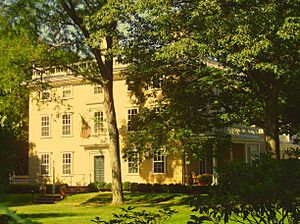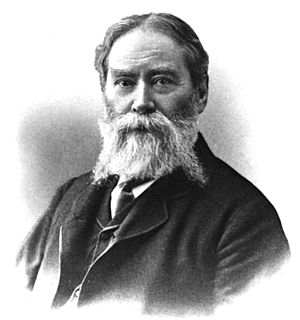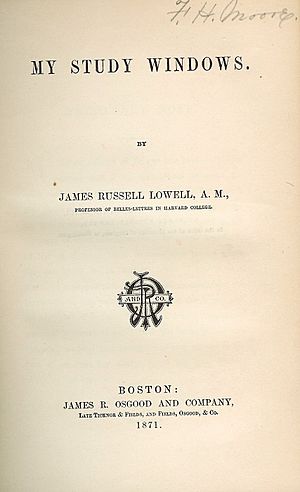James Russell Lowell facts for kids
Quick facts for kids
James Russell Lowell
|
|
|---|---|
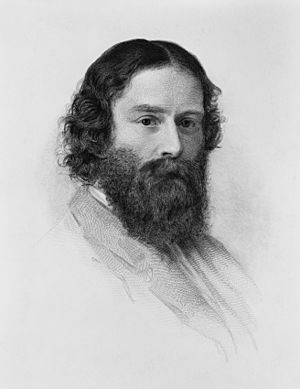
James Russell Lowell, c. 1855
|
|
| Born | February 22, 1819 Cambridge, Massachusetts, United States |
| Died | August 12, 1891 (aged 72) Cambridge, Massachusetts, United States |
| Alma mater | Harvard University |
| Literary movement | Romanticism |
| Spouse | Maria White (m. 1844–53; her death) Frances Dunlap (m. 1857–85; her death) |
| Children | 4 |
| Parents | Charles Lowell |
| Signature | |
 |
|
James Russell Lowell (born February 22, 1819 – died August 12, 1891) was an American Romantic poet, a person who writes poems about feelings and nature. He was also a critic, an editor, and a diplomat, which means he represented his country in other nations.
He was part of a group called the fireside poets. These were New England writers who became very popular in America. Their poems were often read aloud by families gathered around a fireplace.
Lowell went to Harvard College and later became a lawyer. He published his first book of poems in 1841. He married Maria White in 1844. They had several children, but sadly, only one lived past childhood.
He became involved in the movement to end slavery. Lowell used his writing to share his anti-slavery ideas. He worked as an editor for a newspaper that supported ending slavery.
Later, he became a professor at Harvard. He also edited a famous magazine called The Atlantic Monthly. Lowell then served as an ambassador for the United States in Spain and England. He spent his last years in Cambridge, Massachusetts, where he was born.
Lowell believed that poets should speak out about important issues in society. He used his poetry to push for changes, especially against slavery. His writing style, including his use of American dialects, inspired other famous writers like Mark Twain.
Contents
Biography
Early life and education
James Russell Lowell was born on February 22, 1819. His family had lived in Massachusetts since the 1600s. His father, Charles Lowell, was a minister. His mother, Harriett, taught him to love books and poetry from a young age.
Lowell started at Harvard College when he was 15. He was not always the best student and sometimes got into trouble. He wrote for the college's literary magazine, Harvardiana.
In 1838, he was chosen to write a poem for his graduation day. However, he was suspended from Harvard and couldn't attend the ceremony. He had to stay in Concord, where he met famous writers like Ralph Waldo Emerson. His poem was still printed for his classmates to read.
After college, Lowell wasn't sure what job to choose. He thought about business, being a minister, or a doctor. He finally decided to study law at Harvard Law School. He became a lawyer in 1842, but he kept writing poems and articles for magazines.
Marriage and family life
In 1839, Lowell met Maria White. They got engaged in 1840. Maria's father wanted Lowell to have a steady job before they married. They finally married on December 26, 1844. Friends said their marriage was very happy. Lowell felt that Maria was a wonderful person.
Maria also wrote poetry and cared deeply about social issues. She was part of a group that worked to end slavery. She encouraged Lowell to become more active in the abolitionist movement. His second book of poems showed his strong anti-slavery feelings and sold very well.
Maria was often sick. The couple moved to Philadelphia for a short time, hoping it would help her health. There, Lowell worked for an abolitionist newspaper. In 1845, they moved back to their family home, Elmwood, in Cambridge.
They had four children, but only one, Mabel, lived past infancy. The loss of his children deeply affected Lowell. He wrote a sad poem called "The First Snowfall" after his first daughter died.
Literary career and famous works
Lowell's first poems were published in 1840. He and his friend Robert Carter started a literary magazine called The Pioneer. It featured new writings and serious reviews of books, art, and music. Lowell wanted it to be a better choice than the "trash" magazines of the time. The first issue even included a story by Edgar Allan Poe. However, the magazine only lasted three months, and Lowell ended up in debt.
Despite this, Lowell kept writing. He wrote articles about ending slavery for a newspaper, but he wrote them anonymously. He thought his ideas would have more impact if people didn't know they came from a known abolitionist.
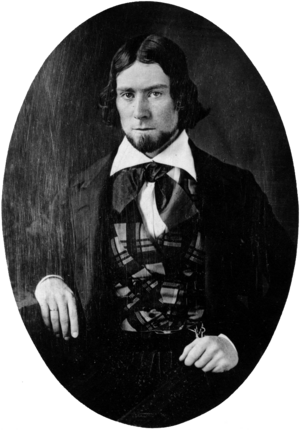
In 1848, Lowell published A Fable for Critics. This book was published without his name on it. It was a popular satire, which means it made fun of other poets and critics in a clever way. Most people liked it, but not everyone was happy. Edgar Allan Poe, for example, didn't like how he was described.
In the same year, Lowell also published The Biglow Papers. This book made him even more famous. It featured characters who spoke in a real American dialect. The book also criticized the Mexican–American War.
Travels and new roles
In 1850, Lowell's mother and his third daughter, Rose, died. This made him very sad. He traveled to Italy to cope with his grief. While there, his only son, Walter, also died. Lowell and his wife returned to the United States in 1852. He later wrote about his travels in a book called Fireside Travels.
His wife Maria, who had been sick for many years, died in 1853. Lowell was heartbroken. He became very private and spent a lot of time alone.
In 1855, Harvard University offered Lowell a job as a professor of modern languages. He accepted, but first, he spent a year studying in Europe. He visited England and France and tried to learn German, which he found very difficult!
He returned to the U.S. in 1856 and started teaching at Harvard. He taught literature and wanted his students to enjoy poetry. In 1857, Lowell married Frances Dunlap, who had been his daughter Mabel's governess.
Editor and Civil War years
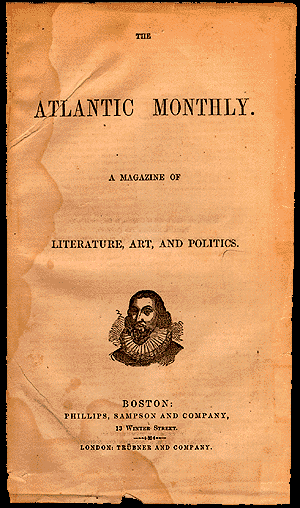
In 1857, Lowell became the first editor of The Atlantic Monthly, a new magazine. He made it a place for high-quality literature and important discussions about public issues. In 1861, his father died, and Lowell moved his family back to Elmwood. He left The Atlantic Monthly that year but continued to write for it.
During the American Civil War (1861-1865), Lowell used his writing to support President Abraham Lincoln and the Union. He lost three nephews in the war. He believed that if the war could end slavery, it would be worth it. He wrote a second series of The Biglow Papers that focused on the war and the end of slavery.
After Lincoln was assassinated, Lowell wrote a long poem called "Commemoration Ode" to honor those who died in the war. Many people praised his poem.
Lowell was also part of the "Dante Club," a group of writers who helped Henry Wadsworth Longfellow translate an important Italian poem called Divine Comedy. In 1869, Lowell published a new collection of his own poems called Under the Willows.
In 1872, Lowell and his wife traveled to Europe again. He received special degrees from Oxford and Cambridge Universities in England.
Political appointments and later life
Lowell stopped teaching at Harvard in 1877. That same year, President Rutherford B. Hayes offered him a job as an ambassador to Spain. Lowell accepted and lived in Spain for eight years. He learned a lot about Spanish culture.
In 1880, he became the ambassador to England. He was very popular there because of his writing. Even Queen Victoria said she had never seen an ambassador who was so well-liked. He became friends with other famous writers like Henry James.
His second wife, Frances, died in England in 1885. Lowell returned to the United States and lived with his daughter. Many of his close friends had passed away, which made him sad. He continued to give speeches and publish collections of his essays and poems.
James Russell Lowell died on August 12, 1891, at his home, Elmwood. He was buried in Mount Auburn Cemetery in Cambridge.
Writing style and literary theory
James Russell Lowell believed that poets were like prophets who could help society. He thought that poetry, religion, and nature were all connected. He also believed that writers should have a strong sense of right and wrong and use their writing to make things better.
Lowell was very interested in language. He helped start the American Dialect Society. He used his knowledge of language in his writing, especially in The Biglow Papers. In this book, he wrote characters who spoke in a real Yankee dialect, using unusual spellings to show how people actually talked. He wanted to show how Americans truly spoke, not just formal language. For example, one of his characters says:
Ef you take a sword an' dror it,
An go stick a feller thru,
Guv'ment aint to answer to it,
God'll send the bill to you.
Lowell was one of the fireside poets. This group of New England writers, including Henry Wadsworth Longfellow and Oliver Wendell Holmes Sr., was very popular in the 1840s. Their poems were often read aloud by families at home.
Beliefs
Lowell was an abolitionist, meaning he wanted to end slavery. He supported the right for black people to vote. He and his first wife, Maria, often gave money to enslaved people who had escaped. However, his views on African-Americans were sometimes complicated.
Lowell was also involved in other movements for change. He wanted better conditions for factory workers. He was against the death penalty and supported the temperance movement, which aimed to reduce alcohol use.
Criticism and legacy
Lowell once said he was the first poet to truly express "the American Idea." Other writers admired him. Poet John Greenleaf Whittier called him "one of the strongest and manliest of our writers." British author Thomas Hughes said Lowell was one of the most important writers in the United States. Lowell's clever satires and use of dialect inspired writers like Mark Twain.
However, not everyone agreed. Some critics felt his poetry was not very deep. Even his friend Ralph Waldo Emerson thought Lowell's poems showed his ambition more than a true inner feeling. Some later critics found his poetry forgettable.
Despite some mixed reviews, Lowell's impact is still recognized. In 1969, a major literary organization created a prize named after him for excellent literary studies.
Lowell's poem "The Present Crisis" was an early work about the national debate over slavery. This poem has been very important in the modern civil rights movement. The National Association for the Advancement of Colored People (NAACP) named its newsletter The Crisis after this poem. Martin Luther King Jr. often quoted lines from it in his speeches.
List of selected works
Poetry collections
- A Year's Life (1841)
- The Biglow Papers (1848)
- A Fable for Critics (1848)
- The Vision of Sir Launfal (1848)
- Under the Willows (1869)
- The Cathedral (1870)
- Heartsease and Rue (1888)
Essay collections
- Conversations on Some of the Old Poets (1844)
- Fireside Travels (1864)
- Among My Books (1870)
- My Study Windows (1871)
- Political Essays (1888)
See also
 In Spanish: James Russell Lowell para niños
In Spanish: James Russell Lowell para niños
- Dante Society of America
- Lowell High School (San Francisco)
 | Valerie Thomas |
 | Frederick McKinley Jones |
 | George Edward Alcorn Jr. |
 | Thomas Mensah |


